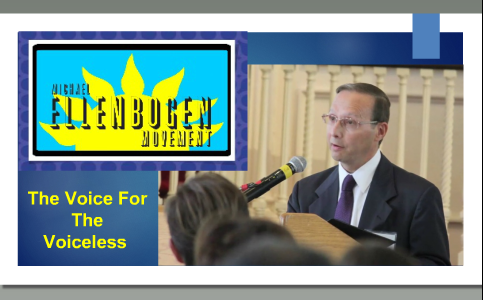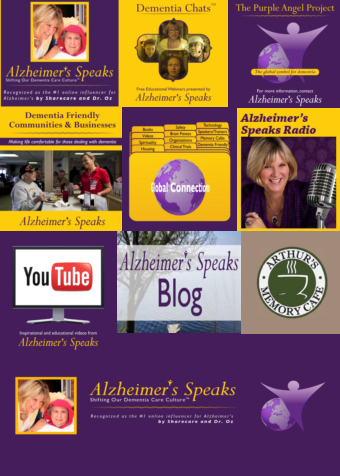Life With Dementia – Why It Is So Important For Us To Listen To Those Diagnosed
Life With Dementia –
Why It Is So Important For Us To Listen
To Those Diagnosed
This is one of the most interesting and thorough book reviews I’ve ever read. Eilon Caspi, Ph.D. really has done a nice job breaking down Michael Ellenbogen’s book, From the Corner Office to Alzheimer’s for us, He so simply shares critical insights for those diagnosed, families caring for loved ones as well as professionals. Please read the excellent review below.
I’ve been in the aging field for 20 years, the last 10 of which solely focusing on various issues related to improving the quality of care and life of persons with dementia. Nothing has taught me more about the lived experience, struggles, and hopes of persons with Younger-Onset Dementia than this book.
Many people think they understand dementia but they don’t really have a nuanced understanding of what it actually means to live with it. This book is precious because it helps bridge this major gap.
You often learn about discrete aspects of the lived experience of persons with dementia but rarely have an opportunity to get a holistic and ongoing picture of a person’s journey through the early stages of dementia.
The best educational materials usually come from persons living with dementia. The knowledge from inside out is unparalleled in value and could be an effective vehicle for change in our culture and approach towards persons living with dementia.
With this book, Michael gives us a rare opportunity to come closer to understanding the avalanche of losses and emotional pain caused by dementia. As importantly, it demonstrates how misinformed perceptions about persons living with dementia can have tremendous effects on the person’s psychological well-being.
Through his persistent commitment to detailed documentation of his daily experiences, Michael teaches us about the emotional roller coaster commonly experienced by persons with dementia on a daily basis.
Through his experiences we learn about serious gaps in services, programs, and policies that cause tremendous frustration and suffering to persons with dementia. These often under-recognized issues in our communities and society limit these individuals’ ability to reach their full potential and preserve their dignity. They also prevent family members from getting the support and respite they sorely need.
The insights and lessons shared in the book (such as the long and excruciating journey for getting a diagnosis) will prove critical for many others who currently experience early signs of dementia as well as for those who will develop dementia in the future. They will substantially reduce the suffering of these individuals and their family members, save precious years of life, and help minimize loss of income.
The book could also be used as an excellent teaching tool for various health professionals who are committed to truly understanding the lived experience of persons with Young-Onset Dementia and the wide spectrum of cognitive disabilities caused by this set of conditions. This, as Michael points out, while taking into account that every person is impacted by the disease differently and Michael’s experience may not be representative of all persons with similar conditions.
If used to inform educational materials and training programs, the heartbreaking examples in the book could help improve practices, skills, and sensitivities of diagnostic centers / memory clinics and ensure that clinicians will always listen to persons with dementia and take their concerns seriously.
The struggles experienced by Michael also include numerous frustrations at home in general and with loving, caring, and dedicated family members. The insights shared about these struggles will go a long way in educating family members in dealing with these issues (e.g., denial of dementia, misperceptions, helpful communication techniques, finding joy, and safety issues). They will increase sensitivity among family members to the person. The book also shows how the power of love can sustain persons with dementia in their constant efforts to maintain hope.
The devastating financial impact of the disease on Michael and his family is an underlying theme throughout the book. This knowledge could be used to inform initiatives that will transform federal and state agencies’ decision-making processes, practices, guidelines – and eventually laws that govern and oversee operations of these agencies – to ensure that lifelong hard work of citizens will not be forgotten during times of dementia-related disability and that their rights for financial security will be protected.
The book could be used to increase sensitivity among employers to employees who gave their heart and soul for many years to ensure the financial stability and success of their companies. No dedicated and honest employee should go through what Michael has gone through when he was fired from his 18-year job. We must find ways to ensure that employers will become dementia-friendly and treat their employees with dignity during times of disability.
An excellent chapter in the book is dedicated to important considerations and suggestions pertaining to the process of applying for disability benefits (written by an experienced attorney – John Tucker, Tucker & Ludin, Legal Solutions).
The book addresses other important issues such difficulties with short-term memory, reading and writing, reaching desired destinations, the impact of the physical environment (e.g., noise), driving; dementia work-up for doctors; and assisted suicide. It also provides a strong reminder that persons with dementia may experience other health conditions that tremendously impact their quality of life.
Using numerous examples, Michael teaches us about how he copes (often creatively) with the many functional, cognitive, and psychological losses and challenges along the way. The book contains dozens of concrete suggestions, tips, and helpful resources for dealing with the limitations imposed dementia and those caused by others’ misperceptions, lack of awareness, and insensitivities.
The book also highlights the urgent need of our society to develop dementia-friendly work and volunteer opportunities to ensure that the wealth of life experience, knowledge, professional skills, and wisdom of persons with dementia will be used wisely and creatively to benefit our local communities and give life-sustaining meaning and purpose to these individuals.
The book could inform efforts to reduce the harmful stigma commonly held about persons with dementia and in so doing increase the likelihood that these individuals will be approached with empathy and respect.
It is a powerful, honest, and inspiring testament of the strength and resiliency of the human spirit despite a cruel disease, its many devastating and heartbreaking impacts, and the lack of awareness and sensitivity in our society to this condition.
I highly recommend you to receive this precious (if not life saving) gift Michael has given us. It was an extremely frustrating process for Michael to write the book with his cognitive limitations and we should be grateful that he found the inner strength to complete the writing with the help and support from his wife and his family.
In the words of the late Prof. Tom Kitwood, author of the groundbreaking book Dementia Reconsidered: The Person Comes First,
“People with dementia may have something important to teach the rest of humankind. If we make the venture one of genuine and open engagement, we will learn a great deal about ourselves.”
Reading this book will bring us one solid step closer to the realization that at the end of the day we are all interdependent on each other and that only with this deep understanding we will be in a position to realize Michael’s vision for a truly dementia-friendly society.
Hope you’ll find the book useful as I did,
Yours sincerely,
Eilon Caspi, Ph.D.
Center for Prevention of Resident to Resident Aggression In Dementia
Click the video above to see how Michael Advocates
for change to improve dementia care.
Click Here To See How You Can Make A Major Difference
Raising Awareness





I didn’t realize that Michael had written this book, and Eilon’s review is exceptional. I’m going to add this book to my list now and I look forward to getting in inside perspective from Michael.
OH that is wonderful Mike! Thank you for sharing it with your audience as well.
Lori
“The best educational materials usually come from persons living with dementia. The knowledge from inside out is unparalleled in value and could be an effective vehicle for change in our culture and approach towards persons living with dementia.” Thank you !!! — True
Thank you Truthful Kindness